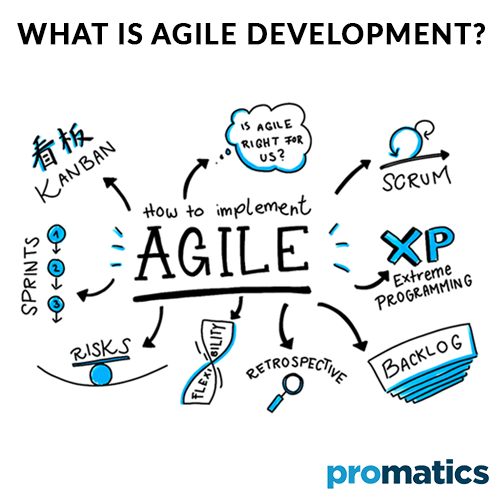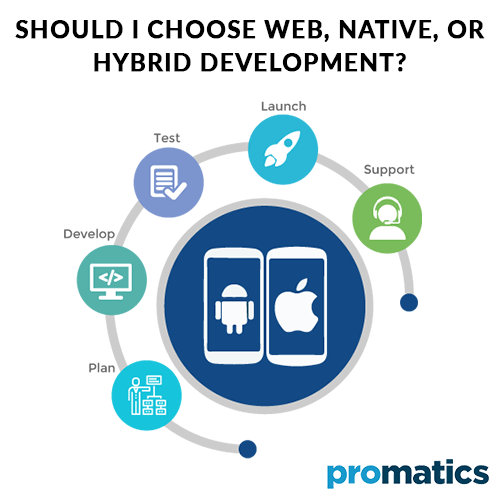What are The Top 10 Common Mobile App Development Questions?
Mobile app-based businesses have seen a massive upsurge, recently. You can convert an interesting idea into a business opportunity with the right kind of knowledge and resources. However, most of the times’ idea innovators have unanswered questions that plague them and stop them from working to bring their idea to reality. We at Promatics believe that having the right mindset, skills and passions, you can be a successful entrepreneur. Here is a post about the top 10 common mobile app development questions that we often get:
Question I: How Can I Validate My App Idea?
Answer: You can use a Proof of Concept (POC), Prototype, or a Minimum Viable Product (MVP) to validate an app concept. Not only do they validate an app idea, but also elicit allied new ideas, open up areas for improvement and help raise investment from clients and stakeholders. Each of the three given methods is individually advantageous when used correctly. The Proof of Concept (POC) allows you to test if the app idea is feasible. Mobile App Prototype allows you to check how a particular product would function. It helps validate the strategic design direction of a product. An aspiring app business can test how customers use and react to the overall user experience (UX) design through a prototype. Moreover, a Minimum Viable Product (MVP) helps configure a product’s core functionality and value proposition. With MVP development business can learn how the product’s target users experience and respond to the app’s core business.
Question II: How Much does it Cost to Develop an App?
Answer: App development can incur expenses depending on factors like project size, technical complexity and even proficiency of a development partner. Detailed planning and management are imperative to keep the development costs in check. If a development team connects product features and functionality to user pain points during product design and discovery phase, ensures error-free development.
and sees through inevitable changes to achieve the original product goal, they can keep the development costs in check while delivering a product that meets the user’s expectations. Take a look at the elements that decide the cost of a small business app here. There are hidden costs involved in running and maintaining an app, read about them here.
Question III: How Will My App Make Money?
Answer: A right mobile app monetization model is the secret sauce for success an app business. While a compatible strategy can have the money pouring into the business, the wrong one can mar the overall user experience resulting in massive losses for the business. Work out a monetization strategy before the launch of your app product depending on the business objectives to generate optimal profits. There are monetization models that are compatible with some particular types of apps. Count in your product type, nature of user base, market intelligence before you choose the app monetization model and this would increase your chances of profitability. Common app monetisation strategies include:
a.) Advertising based model
b.) Pay Per Download model
c.) In-App Purchases model
d.) Freemium model
e.) Subscription model
Most commonly, the subscription model works best for music and video streaming, news and entertainment, and other apps that function on quality content. In-app purchases are a profit bearing option when you have a free-to-play games apps centred around products.
Question IV: What is Agile Development?
Answer: Agile Development is an app development methodology that ensures greater flexibility and adaptability throughout the process. It is an interesting process where the app features and requirements are built, tweaked, and approved all before the project reaches wholesome completion. Agile practitioners generally split one large module into smaller chunks so that task can be performed into an easy and efficient way. The distinct advantages of using the agile methodology ensure that the developers review progress at each stage and make improvements wherever necessary before the project is finished. Using an Agile way of development, developers can integrate documentation and perform quality testing at every step. If you are wondering how you can master the most important aspect of Agile Development, read further here.
Question V: Is a Mobile Website Good Enough?
Answer: It depends. The choice between getting a mobile app or a mobile website for a business needs to be made on the basis of objectives of the business in concern. If the business thrives through offering mobile-friendly content to its audience, then they should go for a mobile website. It would be a cost-effective way to pedal your content towards your audience.
The only downside with a mobile website is a plausible flaw in quality and functionality in the form of performance and usability issues. Users may struggle with load times, lack of information, and network availability that work against your brand name. Mobile apps, on the other hand, allow superior ease of engaging, interacting and communicating with your customers. It works like a customisable communication tool, uniquely leveraging user interests, location usage behaviour and so much more. Not only it ensures a superior user experience, but it also drives customer loyalty in the long run.
Question VI: Should I Choose Web, Native, or Hybrid development?
Answer: Business objectives and overall product goals help the decision regarding Web, Native or Hybrid app development.
Native Apps are for specific platforms. This makes them fast and responsive. They ensure the best performance and user experience on the whole. Native apps enjoy unlimited support from app stores and the overall app marketplace. They are interactive, intuitive, easy to discover on app stores and run more smoothly in terms of user input and output. Developers enjoy full access to the feature set of the operating system chosen for the project. Moreover, from a user’s perspective flow of a native app is intuitive because they are developed on the basis of a mobile operating system’s specific UI guidelines and standards. However, they are a bit complex to develop as they use difficult programming languages and thus incur more expenses.
Web Apps, on the other hand, are easy to build but are slow performers. They come with distinct ease of maintenance due to the joint code base across multiple mobile platforms. Web apps run well inappropriate web browsers, do not require app marketplace approvals and are cheaper to develop. A Web app doesn’t need to adhere to standard operating system protocols. However, the downside of a web app is that there is a little scope of leveraging device features and hardware. They are very difficult to discover in an app store. Interact with different web browsers disrupts the usage patterns and performance metrics. If you still want to know how to develop a progressive web app, find answers here.
The third viable alternative, hybrid apps load in webview. Developed on a single codebase, Hybrid apps enjoy access to a device’s internal APIs and device hardware.
They can be pretty expensive to develop depending on the customisations you seek. The business is dependent on a third-party platform which can be undesirable.
Question VII: Which is Better: Manual or Automated Testing?
Answer: Manual testing garners visual feedback for the business. Not only it brings in real human input, but it is also less expensive upfront. Exploratory testing is a type of manual testing where the tester’s knowledge, experience, logical skill, and intuition counts. Human ability and consideration are critical factors for manual usability testing. It is used to determine how interactive, convenient, and capable the software is. In the ad-hoc testing scenario, the insight and knowledge of the tester are only what counts.
Automated testing is fast and efficient. Test ones generated can be used for different codes and it also offers better visibility into app performance. When an app business wants to test regression, performance, load testing, and desires repeated execution, automated testing works the best.
Question VIII: How Do You Plan to Maintain Your App Post-Launch?
Answer: After the app launch, updates, bug fixes, additional features and functionality improvements eat up a lot of time. An app thrives only with constant care and upgradation. One needs to monitor analytics closely to identify areas where there is scope for creating more value for the user. Analysing metrics will help you understand how you can expand your product to optimize its value. A product roadmap can be used to address the need for a direction in the post-development procedure.
Question IX: Should I Outsource Mobile App Development?
Answer: You can be a non-tech innovator struck with a million-dollar idea only waiting to collect a team of app development experts and bring them on-board with you. Or you can be a smart entrepreneur with an app idea, outsourcing the app development to a team of experienced techies and fetching million dollars before you know it! Putting in place an in-house team can limit accomplishments in a given timeframe. Additional infrastructure to accommodate app development can be expensive Outsourcing mobile app development ensures expertise, flexibility and early adoption of trends and technologies.
Question X: What Should I Look for in a Development Team?
Answer: Begin with referrals and network your way into a circle of app innovators to gain access to honest reviews about the development procedures of various teams.
Interview the team about the methodology they employ, their views on product strategy, platform knowledge and UX/UI Design. Take a look at their portfolio.
Here we have answered the Top 10 Common Mobile App Development Questions. If there is any other app development query you would like us to address, we would be happy to hear from you!
Still have your concerns?
Your concerns are legit, and we know how to deal with them. Hook us up for a discussion, no strings attached, and we will show how we can add value to your operations!




